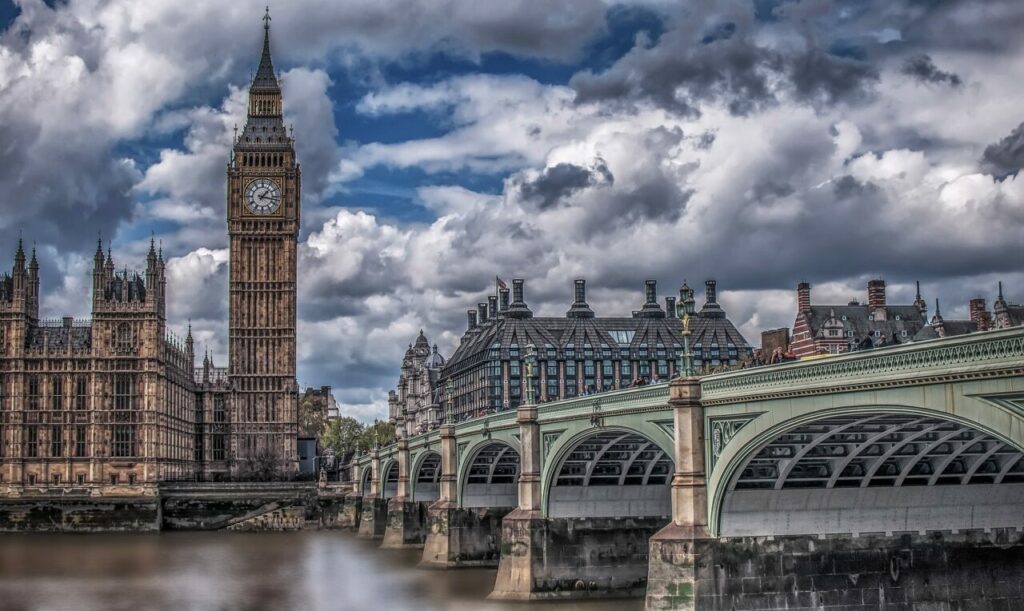On Thursday 30 March the UK Government published its revised energy security strategy titled Powering Up Britain, in what was dubbed ‘Green Day’.
Alongside this strategy, the Government published a number of supporting documents, which Carbon Brief counted at 50 documents totalling 2,999 pages so far.
Building on its previous article, Current± breaks down the Powering Up Britain paper below, highlighting new schemes, policies and investments including links to supporting government documents.
2023 Green Finance Strategy
Alongside Powering Up Britain the UK Government also published the updated 2023 Green Finance Strategy, which aims to mobilise private investment to strengthen the UK’s position in the global green finance market.
The Green Finance paper also sets out the Government’s pathway for the UK to become the world’s first Net Zero Aligned Financial Centre.
Grid: Connections plan due in the summer
According to the paper, the Electricity Networks Commissioner has been called to advise the government on how it can accelerate grid delivery; the Commissioner will present their finding in June 2023. The Government has said it will respond to this announcements this year.
Following conversations with the energy industry and Ofgem surrounding the grid connections process, the government has pledged to publish a connections action plan in summer 2023.
Planning permission revisions
The government has published five revised National Policy Statement’s (NPS’s) including one for the Renewable Energy Infrastructure and Electricity Networks Infrastructure.
Offshore and onshore wind support
The revised NPS’s mentioned above include a new requirement for offshore wind to be considered a “critical national infrastructure.”
Onshore wind was recognised as a cheap an efficient technology and the paper revealed the the government has consulted on changes to planning policies for onshore wind in England to deliver a localised approach to renewable energy.
The government said it would respond to the National Planning Policy Framework consultation calling for the revision of the de facto ban on onshore wind “in due course.”
Hydrogen: plans for supportive legislative powers
Following the announcement of the first winning projects form the £240 million Net Zero Hydrogen Fund yesterday (30 March), the government has announced its shortlist of projects for due diligence in the first electrolytic hydrogen allocation round; through which the government intends to support 250MW of electrolytic hydrogen capacity.
The successful projects of this round will be government-funded until a hydrogen levy is put in place.
To accelerate the road to hydrogen transport and storage infrastructure business models by 2025, the government has announced its intention to introduce supportive legislative powers “when parliamentary time allows.”
Clean heat market mechanism and heat networks
Within the paper, the government announced its intention to implement a Clean Heat Market Mechanism in 2024. This infrastructure aims to “incentivise heating system manufacturers to deploy heat pumps as a proportion of fossil fuel boiler sales.”
The Heat Network Transformation Programme will receive £220 million government funding over 2025/6 and 2026/7, as confirmed by the paper.
REMA: Further consultations
Following the publication of the Review of Electricity Market Reform consultation summary at the beginning of March, the paper announced that consultations will resume in Autumn.
Supporting Green Skills
The paper confirmed that the Government would set initial actions taken from the Net Zero Power and Networks pilot working group to support workers during the energy transition.
Following this a “suite of comprehensive actions” for multiple sectors, which can be used as templates for sectoral assessments will be published this summer.
By the end of this year the Government has pledged to launch 35 different bootcamp courses across England to support the green energy sector with skills shortages.
Rebalancing gas and electricity prices
The Government has committed to outlining a clear approach to gas and electricity ‘rebalancing’, as recommended in the Chris Skidmore MP’s independent review of the energy market.
According to the paper, significant progress on balancing relative prices ought to be seen by the end of 2024.
Electric Vehicles (EVs)
The final consultation of the Zero Emission Vehicle mandate has also now been published requiring more new car and van sales to zero emission.
Sustainable aviation fuels: the road to net zero flights
Commercialisation of sustainable aviation fuels (SAF) will now begin in the UK. The road to net zero flights include a second application window for as much as £165 million Advanced Fuels Fund and grants submitted towards Airbus to support research of ultra-low emission and hydrogen aircrafts.
The Government’s sustainable aviation fuel consultation 1 response can be found here.
Carbon Capture Usage and Storage (CCUS)
The eight projects that will progress to negotiations to form the first two CCUS clusters in the North East and North West were included in yesterday’s announcement.
The paper adds that the UK Government will also launch a process that will allow the expansion of those Track-1 cluster later this year. The process of confirming the cluster for deployment in Track-2 has also now been published.
“This should be the moment to seize the economic opportunities of the global green race but instead the government’s dithering risks the UK becoming the ‘sick and dirty’ man of Europe once again,” said Luke Murphy, Institute for Public Policy Research’s associate director and head of its work on climate, nature, and energy.
“To compete with our international counterparts, we need a step change filling the close to £30bn annual gap in investment needed to reach net zero and restore nature, and committing to a modern industrial strategy. That means investing in clean homes, transport, and industry.
“There appear to be some welcome though minor measures, consultations and reannouncements announced today, but the government must urgently bring forward its plans now postponed till later in the year. The UK needs to change course urgently, before it’s too late.”






